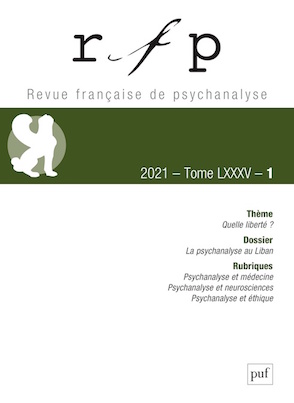Le programme des conférences ouvertes de l'année 2025-2026 est en ligne. Il est diffusé dans la section Calendrier (Activités scientifiques).
Le programme des séminaires de l'année 2025-2026 est en ligne. Il est diffusé dans la section Séminaires (Activités scientifiques).
CONGRÈS INTERNATIONAUX
2026
La section "Publications" vise à faire connaître les références bibliographiques des membres (publications éditées ou à paraître), les conférences déjà données ainsi que les articles qui traitent de questions théoriques, cliniques et de technique psychanalytique. Une section est également consacrée aux commentaires d'articles et d'ouvrages.
Pour une meilleure fonctionnalité du site, utiliser le navigateur Google Chrome ou Safari.
|
Bienvenue sur le site de l'ALDeP
Thème de l'année 2025-2026

FINS ET FINALITÉS
ARGUMENT
« … Et ceci : quand le train entre en gare, le voyage n’en est pas pour autant fini ! »
Jean-Bertrand Pontalis, L’inachèvement,
Nouvelle revue de Psychanalyse, 1994.
Alors que le monde avance en accéléré, la psychanalyse nous invite à revenir en profondeur. À travers notre thème, nous avons choisi d’interroger la psychanalyse à la fois comme pensée en mouvement et comme processus élaboratif, dont les visées, longtemps débattues, demeurent une référence vivante, capable d’interpeller et de faire réfléchir. Ce thème nous convie à retracer l’histoire de la psychanalyse et à questionner sa place dans notre culture contemporaine. Nous reviendrons sur des concepts incontournables, ainsi que sur les questions liées à l’intemporalité de la cure, à son terminus et aux aménagements psychiques possibles.
Les notions de « fin » et de « finalité » ouvrent à une double réflexion : celle de la demande et du but, mais aussi celle de la terminaison et des commencements nouveaux. Dans L’Esquisse... (1895), Freud décrit la rencontre analytique comme un moment profondément humain, où deux êtres se mettent en relation — l’un secourable, l’autre en détresse. Dès lors, l’inconscient, véritable « mine d’or », est à exploiter avec patience et rigueur, offrant au patient la possibilité de déployer son témoin interne.
La finalité peut ainsi se penser comme transformation, ouverture singulière et transmission, tant dans l’intime que dans le collectif. La question de la guérison sera abordée à la fois comme mythe et comme réalité, ce qui ouvre le débat sur le désir, les promesses et les limites de la psychanalyse.
Maria Jabbour
Pour le comité scientifique
Illustration : René Magritte, Décalcomanie, 1966.
Calendrier des activités scientifiques.
Conférence du jeudi 27 novembre 2025

ENTRE DEUX NAISSANCES
Le travail psychique de la grossesse
Nadine Maalouf Haddad
Modératrice : M.-T. Khair Badawi
Le psychanalyste, à l’image de la femme enceinte, incarne une fonction de contenance et de gestation symbolique : il reçoit, transforme et restitue, jusqu’à permettre une naissance — psychique ou physique. « La mère (ou l’analyste) reçoit les projections de l’enfant, les transforme et les lui restitue sous une forme tolérable » (W. Bion, Learning from Experience, 1962). Il est ainsi le lieu de la transformation, garant du processus de liaison psychique et de symbolisation des affects.
La position analytique se définit dès lors par une disponibilité à accueillir l’inconscient du patient. Cette capacité de contenance trouverait écho dans la figure de la femme enceinte, porteuse d’un objet interne en elle. Comme la grossesse, la cure analytique suit une temporalité propre, un rythme interne, que nul ne peut précipiter.
Alors, que naît-il dans une analyse ? Et que signifie « mettre au monde » une part de soi ? Nous tenterons de l’explorer à travers la clinique de patientes sur le divan, qui montrent comment le processus analytique rejoint, parfois de manière inattendue, celui de la grossesse.
Enfin, nous interrogerons la finalité de ces deux parcours — celui de la mère et celui de l’analyse — ainsi que la place qu’ils occupent dans ce cheminement où quelque chose peut se transformer, naître, ou simplement s’esquisser.
Le jeudi 27 novembre 2025 à 19h30 à l'hôtel Smallville, rue de Damas, Badaro.
Illustration : Girl before a Mirror, Picasso, 1932
 DOSSIER DOSSIER
La psychanalyse au Liban
Soigneusement préparé par les deux comités de rédaction qui se sont suivis, un dossier sur la psychanalyse au Liban figure dans le numéro 1/2021 de la Revue française de psychanalyse sur le thème Quelle liberté ?
Il retrace les tenants et aboutissants de moments d'histoire de la psychanalyse dans le pays des cèdres.
Le nouveau directeur, Vassilis Kapsambelis, termine son éditorial par le paragraphe suivant : « Le hasard a voulu que ce premier numéro accueille un dossier sur la psychanalyse au Liban, pays durement touché depuis des décennies par des crises diverses, comme pour rappeler combien la question de la liberté est au cœur de la psychanalyse : de sa pensée comme de son exercice. »
Auteurs ayant contribué au dossier : M. Khoury, W. Abou Habib Kallassi, M.-T. Khair Badawi, M. Osseiran, M. Chahoury Charabaty.
(Accéder au sommaire et aux résumés des articles)
Présentation de l'ALDeP
L'Association Libanaise pour le Développement de la Psychanalyse (ALDeP) est rattachée à l'Association Psychanalytique Internationale (IPA) et à la Fédération Européenne de Psychanalyse (EPF) en tant que groupe d'études depuis janvier 2010 et société provisoire depuis juillet 2021.
Fondée par cinq psychanalystes libanais membres de l'IPA, elle est officiellement reconnue par l'État le 26 mars 2009 (Journal officiel du 2/04/2009). Son but est de transmettre et développer la psychanalyse comme discipline scientifique spécifique et comme méthode thérapeutique et de recherche en accord avec l'œuvre de Freud et ses successeurs.
Elle a pour principaux objectifs de diffuser la psychanalyse en organisant séminaires, journées d'Études, colloques et congrès, et d'encourager les échanges avec des collègues d'orientations diverses en consolidant des relations avec des sociétés psychanalytiques au Liban et à l'étranger.
Elle se propose d'organiser la formation de candidats à la pratique de la psychanalyse en maintenant les invariants de base de la formation (cure psychanalytique personnelle, analyses supervisées et séminaires d'enseignement) tout en reconnaissant le rôle central du psychanalyste et sa responsabilité dans le processus de la cure.
(Voir la suite de ce texte dans la section Présentation de l'ALDeP.)

 ALDeP sur Wikipédia (fr)
ALDeP sur Wikipédia (fr)
Histoire de l'IPA (ar)

The Lebanese Association for the Development of Psychoanalysis (ALDeP) has been founded in 2009 with the aim of promoting psychoanalytic thinking and organizing the training of candidates.
History
In Lebanon, the practice of psychoanalysis began in the 1970s, driven by the interest of psychologists and psychiatrists in Freudian theory. The outbreak of the Lebanese Civil War in 1975 disrupted the initial efforts of these pioneers but did not prevent them from continuing their clinical practice, academic work, and teaching.
A few years later, the Lebanese Psychoanalytic Society was founded in 1980. From this first society, emerged groups and associations, including the Lebanese Association for the Development of Psychoanalysis, first Association in the Arab World to join the International Psychoanalytical Association, which was founded by Sigmund Freud in 1910.
Creation of the Lebanese Association for the Development of Psychoanalysis
In March 2009, five psychoanalysts, Mona Charabaty, Wafica Kallassi, Marie-Thérèse Khair Badawi, Nagib Khouri and Maurice Khoury, founded the Lebanese Association for the Development of Psychoanalysis. They were soon joined by Mouzayan Osseiran. The association was officially recognized by the Lebanese Ministry of Interior on March 26, 2009.
ALDeP became affiliated with the International Psychoanalytical Association (IPA) and the European Psychoanalytical Federation (EPF) as a Study Group in 2010 and later as a Provisional Society in 2021.
Scientific activities and training
Scientific activities
The scientific activities of ALDeP consist of seminars, clinical workshops, conferences and meetings. Internal seminars are reserved for training psychoanalysts. Other seminars and clinical workshops are open to psychoanalysts and psychotherapists interested in psychoanalysis.
Conferences and meetings oriented towards a wider audience are regularly held. Besides pure psychoanalytical topics, they generally deal with subjects from various fields such as literature and other cultural oriented themes. Moreover, and from a perspective of dialogue, ALDeP inaugurated, in 2016, debates with psychiatrists and therapists of non-analytical approaches.
ALDeP members also participate actively in scientific meetings outside the association, including the annual French speaking psychoanalysts congress and the IPA and EPF conferences.
Training
Like all psychoanalytical models, it is based on the tripartite concept of training: personal psychoanalysis, supervisions as well as theoretical and clinical seminars. Around the end of the personal psychoanalysis, and if the candidate’s application to institutional training is accepted, he/she is then asked to practice psychoanalysis under supervision and follow simultaneously the theoretical and clinical teaching of the association. After the training's validation by the Education Commission, the candidate can then apply for his/her association's membership.
For more details, please refer to ALDeP presentation, presented in the IPA Cartagena Congress, 2023.
التجمع اللبناني لتطوير التحليل النفسي، المُلحق بالجمعية العالمية للتحليل النفسي وبالاتحاد الفيدرالي الاوروبي للتحليل النفسي، هو تجمع بحثي - تدريبي منذ كانون الثاني 2010
تأسس التجمع على يد خمس محللين نفسيين لبنانيين أعضاء بالجمعية العالمية للتحليل النفسي، وهو مُعترف به رسميا من الدولة اللبنانية في 26-3-2009 - الجريدة الرسمية في 2-4-2009
غايته نقل وتطوير التحليل النفسي كدراسة علمية مختصة وكطريقة علاجية وبحثية متطابقة مع النتاج العلمي لفرويد وخلفائه
من اهم اهدافه نشر التحليل النفسي بتنظيم الحلقات والايام الدراسية، المؤتمرات والندوات، وتشجيع التبادل والتواصل مع الزملاء من مختلف التوجهات وتمتين العلاقات مع الجمعيات التحليلية في لبنان والخارج
كما يقترح التجمع تنظيم التنشئة لمرشحي ممارسة التحليل النفسي مع الحفاظ على الثوابت الاساسية للتنشئة (العلاج التحليلي الشخصي، تحليل موجه وحلقات دراسية تعليمية) مع التأكيد على دور المحلل الرئيسي ومسؤوليته في سياق العلاج
التجمع اللبناني لتطوير التحليل النفسي مبني على اساس مزدوج من الصرامة والابتكار. يتطلّع ان يكون ابداعياً وفي نفس الوقت بأستمرارية مع الماضي والاصول الاولية للخطاب التحليلي في لبنان، ارتداداته وتغيراته
هذه المؤسسة هي ايضا للتذكير بالقواعد الهيكلية لكل علاج تحليلي، مع الاخذ بألاعتبار مسؤولية المحلل على الابتكار المستمر للاصغاء كما ولايجاد بدائل لتفعيل السياق التحليلي بهدف الاكتشاف الذاتي. هي أيضا تذكير بالمكانة الرئيسية لاطار العلاج وللتفسير التحليلي كثوابت مركزية لسياق العلاج، حيث الفعل السلوكي، حتى لو كشف معناه، يستطيع أن يصل في بعض الاوقات الى شل مجرى التحليل
فضلا على ذلك، يعتبر التجمع اللبناني لتطوير التحليل النفسي انه ليس من مصلحة التحليل النفسي في ايامنا ان يبقى على هامش التيار التحليلي العالمي الذي يضم جمعيات غنية علميا ومتنوعة تكامليا. فالبقاء على هامش هذا التيار يؤدي الى خطر العزلة واضعاف الخطاب التحليلي المتعدد والمتغير الذي ما انفك يغتني من ايام فرويد. لذا كان من الاهداف الاساسية لاستهلال التجمع اللبناني لتطوير التحليل النفسي، الانضمام الى هذا التيار بالعمل على ترتيب الخطوات اللازمة للانتساب الى الجمعية العالمية للتحليل النفسي الذي أسسها فرويد عام 1910. هذه الجمعية معروفة بتعددية نماذج التنشئة (النموذج الفرنسي، نموذج ايتنغون ونموذج الاورغواي) المترابطة مع تنوع نظري وعملي. ونجح المسعى بأنضمام التجمع اللبناني لتطوير التحليل النفسي الى الجمعية العالمية للتحليل النفسي في كانون الثاني 2010 كتجمع بحثي - تدريبي
التجمع اللبناني لتطوير التحليل النفسي يأتي في سياق تطور الفكر التحليلي في لبنان. لذا من الطبيعي أدراجه بتاريخ هذا التطور في البلد، الذي عرف عدة أرتدادات مركزة في مجملها حول الجمعية اللبنانية للتحليل النفسي (الاولى في الشرق الاوسط العربي، المؤسسة عام 1980) التي أنشقّت منها عدة مجموعات وجمعيات. ولكن نشأة الخطاب التحليلي في لبنان تعود الى السبعينات (1970) مع اهتمام علماء النفس والاطباء النفسيين بعلم قليل الانتشار في المنطقة. ولكن كُبحت هذه البداية بسبب الحرب الاهلية 1975 ولكنها لم تمنع رائديها من الاستمرار ومزاولة نشاطهم مع ارساء القواعد التعليمية للتحليل النفسي في الجامعات. وتجدر الاشارة ان هناك زملاء تركوا لبنان قبل وأثناء الحرب للاستقرار بالولايات المتحدة، كندا، فرنسا
إنّ التنشئة الفرنسية من منظار فرويد ولاكان، لغالبية المحللين النفسيين الممارسين في لبنان، لم تمنع الانفتاح على تيارات تحليلية أخرى، انفتاح يعود بغالبيته للطبيعة الثقافية التعددية الخاصة بالبلد مع الاهتمام المتزايد للتحليل النفسي للاطفال الذي تطور خصوصا في بريطانيا. التحليل النفسي للاطفال، المراهقين والبنيات النفسية الغير عُصابية، حتمت تعددية تقنية وفكرية في الممارسة، تعددية أغنت كثيرا المقاربة العلاجية للمشاكل النفسية
الفكر العيادي الذي يغلب على التجمع اللبناني لتطوير التحليل النفسي يرتكز على حبكة متعددة النظريات تميز ممارسته وترتكز على تطور كل هذه التيارات مع معادلة من وحي مشهد المجتمع الثقافي اللبناني. مع العلم ان هذا التطور لا يمكنه في اي حال ان يتغاضى عن العودة اليقظة للنصوص التأسيسية لسيغموند فرويد، وللهيكلية النظرية والتقنية التي دشنها
|

